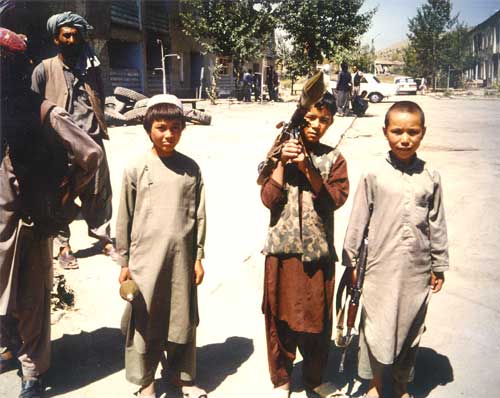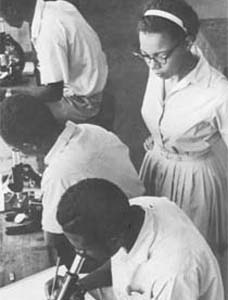
Ivory Coast RPCV Austin Merrill reviews "Children at War"
Everyone loses when a child becomes a soldier
Reviewed by Austin Merrill
Sunday, January 30, 2005
Children at War
By P.W. Singer
PANTHEON; 269 PAGES; $25
When I met Moses Watson in October 2003, he was already a seasoned, haunted war veteran. He sat on a wooden bench, staring at the floor, and described a recurring nightmare: He is running from the front lines in Liberia's civil war when a bullet hits him in the gut.
"All my intestines come out," said Moses, his voice quiet, his legs bony, and his eyes sad and too large for his face. "I have died. I ask God please forgive me."
Moses was 14 years old.
He became a soldier when he was 10, after being abducted from his mother's home in the west African nation of Sierra Leone by marauding government troops from neighboring Liberia.
They took him back to Liberia with some other captured children, forcing them to join the war against rebels who were trying to oust Charles Taylor, Liberia's president at the time. The soldiers taught Moses to use an AK-47 assault rifle, doped him up on marijuana and crack cocaine, and forced him and the other children in his unit to sing in order to calm their fears as they piled into trucks heading for battle.
"The first time I was scared," said Moses. "But when I saw my friend fire, fire, fire -- I became brave. I was a brave man."
By the time I met Moses, his fighting days were over. He was living in a group home for needy children on the outskirts of Monrovia, Liberia's seaside capital city. The home, run by a local aid organization, was a small concrete house on a muddy dirt road behind an outdoor market. Nearly 40 boys lived there, all between 11 and 18 years old. They slept on the floor, ate regular meals and took classes in reading and writing. On the blackboard in the living room, words from the day's vocabulary lesson were written in chalk: "Go. Ball. Pen. Eat."
About two dozen of the boys in the home were former child soldiers, trying to relearn life without guns, drugs, abuse or fear.
They are the lucky ones. Over the past 10 years, more than 2 million of the world's children have been killed in war -- more than 500 each day. Another 6 million have been disabled or seriously injured as a result of fighting in places like Colombia, Kosovo, Sri Lanka, Uganda and Iraq. Currently more than 300,000 children are fighting in wars or have recently been demobilized.
These are just a few of the sobering facts cited by P.W. Singer in his new book, "Children at War," a detailed analysis of the use of child soldiers around the world.
Singer could not have chosen a more heart-wrenching subject, and he leads us carefully through this tender and brutal landscape -- explaining along the way why child soldiering has become such an epidemic and plotting how the problem might be remedied.
The children of this book have been denied nearly every privilege and creature comfort we enjoy, while being subjected to cruelty and horror the likes of which few of us can comprehend.
With the world's conscience pricked by the devastation of the Indian Ocean tsunami and aid donations reaching sums rarely seen, the timing of Singer's book is unsettling. It is a reminder that though sudden and catastrophic destruction may impel us to action, thousands of people die every day from disease and violence without the money or aid that could have saved them.
Singer writes of rebel troops in Sudan who peer into the mouths of children to determine if they are of fighting age -- if two molars are found, the youth is handed a gun and forced into battle.
Elsewhere, armed factions "force captured children to take part in the ritualized killing of others very soon after their abduction. The victims may be POWs from the other side, other children who were abducted for the sole purpose of being killed in front of the recruits, or, most heinous of all, the children's own neighbors or even parents."
In Afghanistan in 2001, some boys were so poor and desperate "that they literally had to choose between following a cow around to scoop up its excrement to sell as fuel or joining one of the armed factions," Singer writes. "The choice of war may be more dangerous, but it at least provides free clothes, food and some modicum of respect."
Singer, who is the National Security Fellow in the foreign policy studies program at the Brookings Institution, is to be commended for drawing attention to the plight of child soldiers. Unfortunately it is unlikely that his dry, academic tone will attract and captivate readers. The lives of child soldiers cry out for the pen of a storyteller; Singer writes of them with the explanatory hand of a policy wonk.
But this is an important book, and we must hope it will inspire others --
activists, politicians, aid workers, journalists -- to become more involved and informed. And the book is certainly not devoid of compelling narrative. Singer interlaces his text with dozens of passages straight from the mouths of child soldiers that are painfully affecting.
One tells of his abduction: "I was nine years old. Six rebels came through our yard. They went to loot for food. ... I heard a gunshot. One of them told me, 'Let's go, they killed your father.' A woman rebel grabbed my hand roughly and took me along. I saw my father lying dead as we passed."
Singer shows that child soldiering is not merely a problem for the volatile far reaches of the developing world. With American soldiers entrenched around the globe, ending the conscription of children is a matter of our own survival as well. The first American killed in combat in the war on terrorism, says Singer, was shot in Afghanistan by a 14-year-old boy.
Singer decries the paltry funding earmarked for child soldier rehabilitation -- the most important step in sustaining peace in many war- prone regions.
Until Western countries donate the money that is needed, people in places like Liberia will have to hope that their own patchwork efforts will be enough to dissuade youth from slipping back into warmongering ways.
For Moses and his friends that I met on the outskirts of Monrovia, the small house they were squeezed into was nearly all they had. Moses' spirits lifted when our interview ended, and he returned to the squeals of laughter coming from the barefoot soccer game in the dirt backyard. Neighborhood children gathered to watch from the sidelines. With stalks of sugar cane as make-believe machine guns, they pretended to fire at the boys as they played, and then they ran away, giggling. •
Austin Merrill lived in Africa for four years, first as a Peace Corps volunteer, then as a reporter. He now lives in New York.











